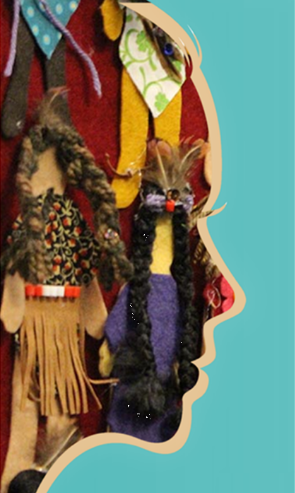We are pleased to present Carolyn DeFord, a member of the Puyallup Tribe of Indians, at a Faceless Dolls workshop. This workshop will connect us more deeply to the issue of Missing and Murdered Indigenous Women and People (MMIWP). DeFord has presented this workshop to both Native and non-Native audiences around the state. Its presentation at EUUC is sponsored by the Advocates for Women and Racial Justice Committees and is supported by our generous pledging EUUC members.
Public awareness of MMIWP has increased
 Over the past few years, the public has increasingly realized that indigenous women are greatly at risk for gender-based violence. Specifically, missing and murdered indigenous women represent an epidemic in many areas of the country, including Washington State. Although the problem is most well-known with respect to women and girls, indigenous men are also at risk. Many of the reasons for increased risk lie in systemic issues such as difficulties in prosecution of non-native people by tribal authorities, lack of coordination between federal and tribal police and legal systems, a large proportion of urban native people who may lack cultural support, the legacy of boarding schools and generational trauma – this is in addition to the risk factors that may affect people and families of any ethnic background.
Over the past few years, the public has increasingly realized that indigenous women are greatly at risk for gender-based violence. Specifically, missing and murdered indigenous women represent an epidemic in many areas of the country, including Washington State. Although the problem is most well-known with respect to women and girls, indigenous men are also at risk. Many of the reasons for increased risk lie in systemic issues such as difficulties in prosecution of non-native people by tribal authorities, lack of coordination between federal and tribal police and legal systems, a large proportion of urban native people who may lack cultural support, the legacy of boarding schools and generational trauma – this is in addition to the risk factors that may affect people and families of any ethnic background.
Washington State is addressing its major MMIWP problem
Washington State has among the highest numbers of MMI women and girls of any state. Over the past few years, the state legislature has become increasingly active on the issue, where it enjoys bipartisan support. Relevant bills directly and indirectly addressing the issue have been featured in our Lobby Room. DeFord is on the Washington State MMIWP Task Force that was authorized by the state legislature in 2021. The Task Force is charged with assessing a broad array of relevant areas, ranging from data management to recommending state resources for enforcement, prosecution and training.
The Workshop in Chapman Hall
The workshop will begin with a presentation by DeFord on the scope of the issue along with possibilities for action. After a light lunch, we will choose stories of individual MMIW as inspiration to create “faceless dolls” from felt, fabric and trim. We will reflect on how this process creates a more genuine connection to the issue. We will also learn about the non-profit Innovations Human Trafficking Collaborative, which helps indigenous and other women of South Puget Sound escape the sex trade. To register, follow this link. If you can only attend the presentation and lunch, please register and let us know at https://euuc.org/email-to-advocates4women/
Giving Opportunity
We have the opportunity to support indigenous and other women fleeing sex trafficking in South Puget Sound through Innovations Human Trafficking Collaborative. You can help by bringing gift cards ($20 maximum face value, to Fred Meyer, Walmart, Amazon, and Target), or cash or check to the workshop or to EUUC on April 14 or 21. You can also contribute online by clicking here and selecting Advocates for Women from the dropdown menu.
Questions? Contact Advocates for Women
